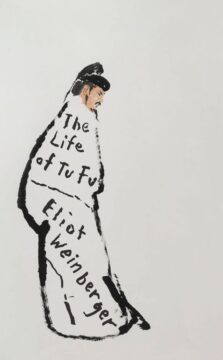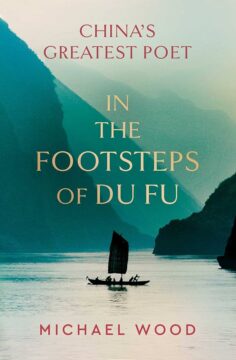by Leanne Ogasawara
 1.
1.
American poet, essayist, and translator Eliot Weinberger opens his new book, The Life of Tu Fu, describing a seminal moment in the Tang dynasty poet’s life, when he had just failed the Imperial Examination —for the second time. Weinberger, it should be said, has not written a biography of the eighth century poet as the title of the book might suggest. Nor has he come out with a new translation of Du Fu’s work. Rather, Weinberger has created a montage of fifty-eight original poems inspired by Du Fu’s life. And in his opening gambit, taking on the voice of the young poet, he compares all the candidates who failed the examination that day to hundreds and hundreds of chickens:
They say this is the only tree in the world that has these pears, for these pears have no desire to propagate elsewhere.
I thought of The Old Man Who Called His Chickens. He had hundreds of chickens, each with its own name. He could call its name and the chicken would come. I thought of him when all the candidates, including me, failed the exam.
One wonders: how is it possible that one of the greatest minds the world has ever known failed the examination not once –but twice? Scholars continue to argue about it. But one thing is clear: this second failure was only the start of Du Fu’s troubles!
 2.
2.
Considered by some people, and I am one of those people, to be China’s greatest poet, Du Fu’s work never went out of style in China. Not even during the Cultural Revolution, when so much traditional culture was canceled, did Du Fu’s light fade. The reason usually cited for this is that Du Fu has always been considered the poet of the common people. He gave voice to their suffering. And he also understood that violence, natural disasters, and war fell disproportionately onto their heads; for unlike the elite, the poor had few options open to them when things got rough. British historian and documentary film-maker Michael Wood, in his wonderful 2023 travelogue In the Footsteps of Du Fu, writes about China’s millennium-long love affair with the Tang dynasty poet. Tracing Du Fu’s life across the vastness of China, from the mountains of Sichuan to the great lakes of Hunan, he wonders whether there has ever been any other poet in the pre-modern world, who “so urgently recorded what it feels like to be a refugee, fleeing for your life?”
When asked: “Why Du Fu?” Wood replies that Du Fu is fascinating for many reasons, not least of all having been born at the precise moment of lift-off of the glorious Tang, considered to be one of China’s great ages of cultural and literary flowering. While Du Fu began life comfortably well-off during the heyday of the Tang, by mid-life he was suffering through the worst of the great chaos following the An Lushan uprising, which saw millions dead with countless more people fleeing for their lives. Read more »
